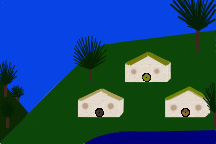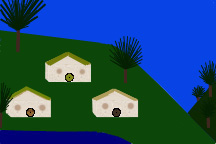 |
|
 |
 |
|
 |
Concerning Hobbits | Calendars & Chronologies | Shire Library | Shire Geography | Mathom House (Misc) | Home
Éomer: This is from a character in Beowulf, and in Old English, it means "horse mare."
Éowyn: In Old English, this means "one who delights in horses."
Grima Wormtongue: In Old English, "grim" means "grim, fierce, cruel, a mask, specter." "Wormtongue" was used to refer to a sarcastic person.
Saruman: In Old English, "crafty man." "Searu" means "craft, device, wile." In Old English, it could be a good or bad description of someone.
Théoden: In Old English, "chief of a nation or a people." Théoden was king of Rohan.
The names in the Edda are: From Brimir and Blain- Motsognir, Durin, Nyi, Nithi, Northri, Suthri, Austri, Vestri, Althjof, Dvalin [Dwalin in the Hobbit], Nar, Nain, Niping, Dain, Bifur, Bofur, Bombur, Nori, An, Onar, Ai, Mjothvitnir, Vigg, Gandalf, Vindalf, Thrain, Thekk, Thorin, Thror, Vit, Lit, Nyr, Nyrath, Regin, Rathsvith, Fili, Kili, Fundin, Nali, Heptifili, Hannar, Sviur, Frar, Hornbori, Fraeg, Loni, Aurvang, Jari, Eikinskjaldi. From Dvalin- Draupnir, Dolgthrasir, Hor, Haugspori, Hlevang, Gloin, Dori, Ori, Duf, Andvari, Skirfir, Virfir, Skafith, Ai, Alf, Yngvi, Eikinskajldi, Fjalar, Frosti, Fith, Ginnar, Lofar.
Durin: Old Norse, "Durinn," one of the ancestors of the dwarves.
Dwalin: Old Norse, "Dvalinn" means "one lying in a trance."
Fundin: Old Norse, "found one."
Gandalf: Appears in the Elder or Poetic Edda and could mean "wand-elf" or "sorcerer elf." In Old Norse "Ganndálf," could mean "sorcerer elf."
Gimli: In The Letters of JRR Tolkien, Tolkien said "Gimli" Tolkien may refer to the archaic Old Norse word "gim," which may mean "fire." In Old Norse, "Gimli" may mean "lee of flame, highest heaven."
Thorin Oakenshield: Old Norse, Thorin, "bold one," and Eikenskjaldi, "with oak shield." from the "Prose Edda".
Carpenter, Humphrey (Ed.). (2000, 1981). The Letters of JRR Tolkien. New York: Houghton Mifflin.
Noel, Ruth S. (1980). The Languages of Tolkien's Middle-earth. Boston: Houghton Mifflin Company.
Oxford English Dictionary: Volume I - A-B. (1961,1933). Oxford: At the Clarendon Press.
Tolkien, JRR. (1994). "Appendices." The Lord of the Rings. New York: Houghton Mifflin.
Visit "Mathomhouse"
Visit our smial (home)